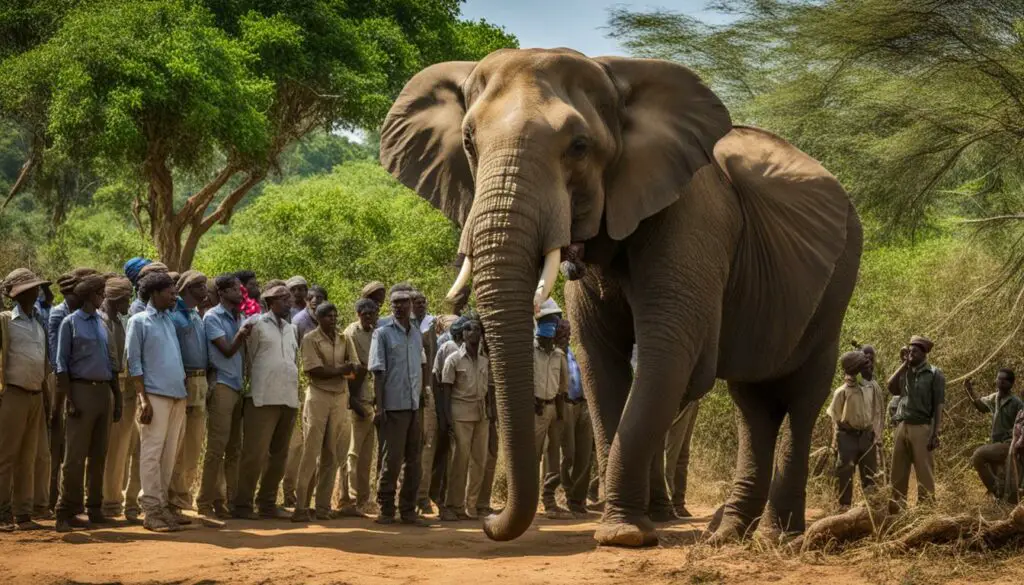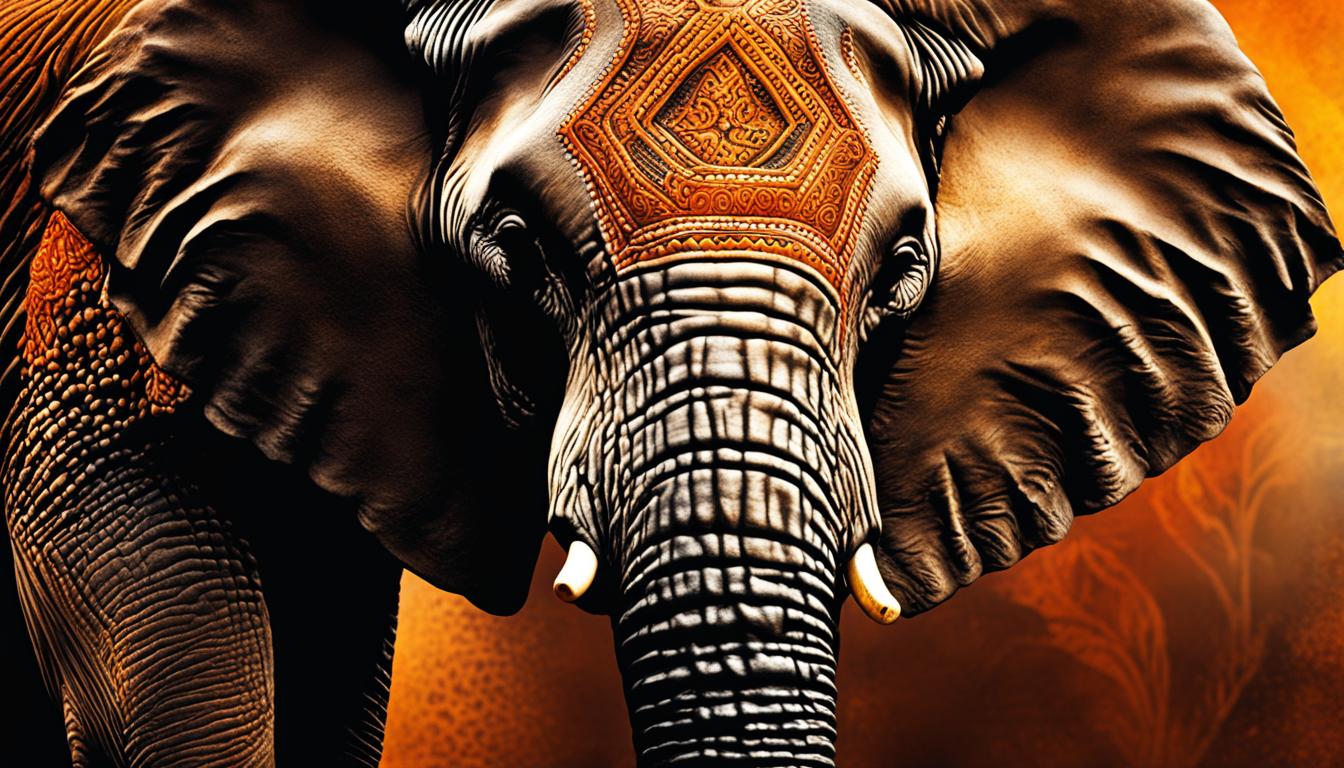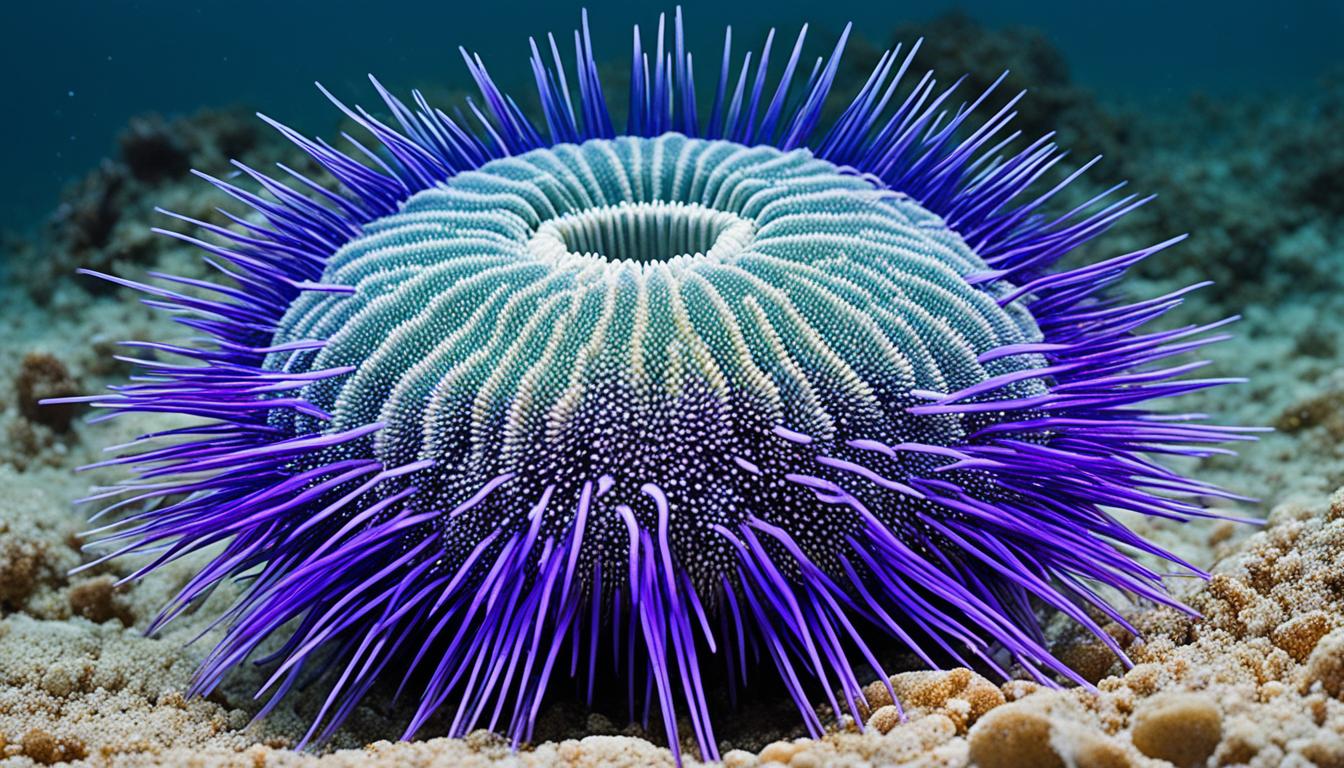Elephants hold a remarkable place in various cultures, showcasing their immense cultural significance and symbolic meaning. They are revered as powerful and wise creatures, embodying strength, resilience, and wisdom. Elephants have played a significant role in art, mythology, religion, and folklore, captivating the imagination of people across time and geography.
Their cultural importance lies in their representation of various attributes and values, such as power, fertility, protection, and unity. From ancient to modern times, elephants have been a source of inspiration and fascination, symbolizing diverse meanings in different cultures.
In this article, we will explore the cultural significance and symbolic importance of elephants, delve into their presence in art, religion, and mythology, and discuss their role as tourist attractions and souvenirs. Join us on this journey to discover the mesmerizing world of elephants and uncover the deep-rooted symbolism they hold.
Elephants in Religion and Mythology
Elephants hold a revered place in many religious traditions and mythologies. In Hinduism, the elephant is associated with the deity Ganesha, the remover of obstacles and the epitome of wisdom. In African folklore, elephants are seen as wise chiefs and mediators in disputes among forest creatures. Elephants also feature in Chinese and Buddhist iconography, symbolizing good luck, protection, and spiritual guidance.
One of the most well-known instances of elephants in mythology is their connection to Ganesha, the elephant-headed deity in Hinduism. Ganesha is revered as the god of wisdom, intellect, and new beginnings. He is often depicted with a human body and an elephant head, symbolizing the unity of the divine and earthly realms. The image of Ganesha is widely worshipped and considered auspicious, with devotees seeking his blessings for success, knowledge, and the removal of obstacles in their lives.
Furthermore, elephants hold significance in African folklore, where they are seen as wise and respected leaders. In many tales, elephants are portrayed as wise chiefs who mediate disputes and offer guidance to the other animals of the forest. This portrayal reflects the cultural value placed on wisdom and leadership, with elephants symbolizing the qualities that are revered and sought after in African societies.
Elephants also play a significant role in Chinese and Buddhist mythology, representing various positive attributes. In Chinese culture, elephants are associated with strength, dignity, and longevity. They are often depicted in art and used as decorative motifs in traditional ceremonies and celebrations. In Buddhist iconography, elephants symbolize spiritual guidance and protection. They are often depicted carrying sacred scriptures or as loyal companions to enlightened beings.
Elephants in Religious Art
The significance of elephants in religion and mythology is also reflected in various forms of art. Artworks depicting elephants can be found in religious temples, shrines, and sacred spaces worldwide. These artistic representations serve as visual reminders of the values and beliefs associated with elephants, offering devotees a tangible connection to their spiritual traditions.
For example, in Hindu temples, intricately carved sculptures of elephants can be found adorning the walls and entrances. These sculptures not only showcase the artistic skills of the artisans but also convey the reverence and importance given to elephants in the Hindu faith. Similarly, in Buddhist art, paintings and sculptures often feature elephants as part of larger religious narratives, symbolizing spiritual guidance and protection.
Overall, the presence of elephants in religious and mythological contexts highlights their symbolic significance and cultural importance. They are revered as wise and powerful beings, embodying qualities such as strength, wisdom, protection, and spirituality. The depiction of elephants in art further amplifies their significance, providing visual representations that serve as tangible reminders of the cultural and spiritual values associated with these magnificent creatures.
Elephant Symbolism in Culture
Elephants hold a significant place in cultural expressions worldwide. They symbolize diverse values such as wisdom, power, fertility, protection, and unity. In African cultures, elephants are revered as symbols of strength, ancestral wisdom, and environmental harmony. In Asian cultures, elephants are associated with royalty, intelligence, and good luck. They are often depicted in traditional ceremonies, festivals, and rituals, showcasing their cultural importance and deep-rooted symbolism.
One of the fascinating aspects of elephant symbolism in culture is its connection to wisdom. Elephants have long been seen as wise creatures, with their age and experience representing a deep well of knowledge. In African folklore, elephants are believed to possess ancient wisdom that they share with those who approach them with respect. Similarly, in Asian traditions, elephants are seen as intelligent beings capable of understanding complex emotions and offering guidance to those in need.
The symbolism of elephants in culture also extends to their role in promoting unity and protection. In many African societies, elephants are considered guardians of their communities, serving as protectors against evil spirits and bringing good fortune. They are seen as a unifying force, embodying the values of cooperation, loyalty, and communal well-being. This symbolism is further represented in the art and artifacts created by these cultures, where elephants are often depicted in group settings, emphasizing their importance in fostering social cohesion.
| Symbolic Values | Cultural Context |
|---|---|
| Wisdom | African and Asian cultures |
| Protection | African societies |
| Unity | African cultures |
“The elephant, with its immense presence and symbolic significance, holds a special place in the hearts and minds of people across cultures. Its representation of wisdom, protection, and unity is deeply rooted in the cultural fabric of societies worldwide.”
Elephant Conservation and Spiritual Meaning
Elephants not only hold immense cultural and symbolic significance but also carry a deep spiritual meaning. Throughout history, elephants have been seen as spiritual guides, embodying qualities such as guidance, protection, and spiritual wisdom. In various cultures, elephants are revered as sacred animals and are believed to possess a profound connection to the divine.
Conservation efforts are crucial in preserving the balance of ecosystems and ensuring the survival of elephants. By protecting these magnificent creatures, we are not only safeguarding the biodiversity of our planet but also acknowledging the spiritual significance they hold. The conservation of elephants serves as a reminder of the interconnectedness of all living beings and the need to protect and preserve the natural world for future generations.

| Country | Conservation Initiatives |
|---|---|
| Kenya | Establishment of protected areas, anti-poaching patrols, community-based conservation projects |
| Thailand | Conservation centers, rescue and rehabilitation programs, eco-tourism initiatives |
| India | Elephant reserves, strict wildlife protection laws, public awareness campaigns |
| Botswana | Elephant monitoring programs, community-led conservation initiatives, research and education |
These conservation efforts not only focus on protecting elephants from poaching and habitat loss but also on raising awareness about their spiritual and cultural significance. By understanding their symbolic meaning and spiritual connection, we can inspire a deeper appreciation for these magnificent creatures and foster a sense of responsibility towards their conservation.
Elephant Symbolism in Art
Elephants have long been a source of inspiration for artists across different cultures and art forms. Their grace, power, and beauty make them captivating subjects, and their symbolic meaning adds depth and significance to artistic expressions.
From ancient cave paintings to modern sculptures, elephants have been depicted in various ways, showcasing their cultural importance and artistic inspiration. In African art, elephants are often portrayed with intricate patterns and bold colors, symbolizing strength, wisdom, and the interconnectedness of all living beings.
In Asian art, elephants are associated with royalty, intelligence, and good luck. In intricate paintings and sculptures, they are depicted in regal poses, adorned with intricate details and vibrant colors. These artworks not only showcase the artists’ technical skills but also convey the cultural values and symbolism associated with elephants in Asian societies.
| Art Style | Symbolic Meaning |
|---|---|
| African Art | Strength, Wisdom, Interconnectedness |
| Asian Art | Royalty, Intelligence, Good Luck |
| Contemporary Art | Environmental Conservation, Interdependence |
Contemporary artists also incorporate elephants into their work to raise awareness about environmental conservation and the importance of preserving these majestic creatures. Through thought-provoking installations and mixed media pieces, they highlight the delicate balance between humans, animals, and nature, urging viewers to reflect on their role in safeguarding the planet.
Whether in traditional or contemporary art forms, the significance of elephants in art goes beyond mere representation. It serves as a reminder of our connection to the natural world, the wisdom and strength embodied by these magnificent creatures, and the need to protect and appreciate their existence.
Artists Inspired by Elephants
- Pablo Picasso: The renowned artist was deeply influenced by African tribal art, which often featured elephants. His paintings and sculptures showcased the power and symbolism associated with these majestic creatures.
- Salvador Dalí: Known for his surrealist paintings, Dalí incorporated elephants into his artwork as a symbol of transformation and the subconscious mind.
- Bharti Kher: This contemporary Indian artist often integrates elephant sculptures covered in bindis, reflecting the importance of traditional symbols in a contemporary context.
- Alexander Calder: The American sculptor created large-scale mobiles featuring elephants, capturing their grace and movement in his unique kinetic style.
“The elephant is a symbol of beauty, strength, and power. Through art, we can explore its profound significance and celebrate its presence in our lives.” – Anonymous
Elephants in Folklore and Mythology
Elephants have captured the imagination and folklore of cultures around the world, featuring prominently in myths and stories that span centuries. These captivating creatures have become symbols of wisdom, strength, and spiritual significance in various folklore traditions.
In Indian mythology, the elephant-headed deity Ganesha holds a prominent place. As the remover of obstacles and the lord of wisdom, Ganesha is revered for his association with elephants. In many stories, elephants are depicted as intelligent, gentle beings who possess great wisdom and power.
African folklore also celebrates the elephant’s symbolic significance. These majestic creatures are often depicted as wise chiefs and mediators between different animals in the forest. They embody values such as leadership, strength, and harmony with nature.
“Elephants are not only respected but also believed to bring good fortune and protect against evil spirits,” explained Dr. Jane Goodall, renowned primatologist and wildlife advocate.
In addition to their representation in mythology and folklore, elephants have also influenced cultural narratives and explanations for natural phenomena. The ancient Indian parable of the blind men and the elephant serves as a metaphor for the limitations of perception, highlighting the importance of seeking multiple perspectives to gain a complete understanding of the world.
Overall, elephants have left an indelible mark on folklore and mythology, shaping cultural narratives and providing insight into the values and beliefs of different societies. Their presence in these stories reminds us of the enduring fascination and reverence humans have for these magnificent creatures.
Elephants as Tourist Attractions and Souvenirs
Experience the wonder of elephants up close and personal through elephant tourism. These majestic creatures have captivated the hearts of people around the world, drawing tourists to countries known for their wildlife and natural landscapes. Witness elephants in their natural habitats, roam freely in their vast territories, and observe their social dynamics. Elephant tourism not only offers a thrilling adventure but also raises awareness about the importance of elephant conservation. As you embark on this unique journey, you contribute to the preservation of these incredible creatures and the ecosystems they inhabit.
While immersing yourself in elephant tourism, don’t forget to bring home a piece of these unforgettable experiences with elephant souvenirs. These souvenirs provide lasting mementos of your encounter with these extraordinary creatures and serve as reminders of the beauty and significance of elephants in our world. From intricately carved sculptures and paintings to elephant-inspired jewelry and textiles, there are endless options to choose from. Each souvenir carries the essence of elephants’ cultural and symbolic importance, allowing you to cherish your connection with these magnificent animals long after your trip ends.
Elephant Tourism and Conservation
Engaging in elephant tourism goes beyond just witnessing the grandeur of these majestic beings. It also plays a crucial role in supporting elephant conservation efforts. By participating in ethical and responsible tourism practices, you contribute to the preservation of elephant habitats and the protection of their populations. Sustainable tourism initiatives ensure that elephants are treated with respect and care, emphasizing their well-being above all else. Moreover, engaging with knowledgeable guides and conservation experts during your elephant tourism experience deepens your understanding of the challenges and significance of elephant conservation, inspiring you to become an advocate for these magnificent creatures.
While enjoying your elephant tourism adventure and selecting the perfect elephant souvenirs, remember the importance of responsible tourism and conservation. By participating in these activities, you not only create lifelong memories but also contribute to the protection of elephants and the preservation of their cultural and symbolic significance for generations to come.
| Elephant Souvenirs | Description |
|---|---|
| Hand-carved Elephant Sculptures | Exquisite sculptures crafted by skilled artisans, capturing the grace and power of elephants in intricate detail. |
| Elephant-inspired Jewelry | Stunning jewelry adorned with elephant motifs, symbolizing strength, wisdom, and protection. |
| Elephant-themed Textiles | Beautifully woven fabrics featuring elephant patterns, ideal for home decor or personal accessories. |
| Elephant Paintings | Vibrant paintings showcasing the beauty of elephants and their cultural significance, created by talented artists. |
| Elephant Keychains | Delightful keychains featuring miniature elephant figurines, perfect for adding a touch of charm to your daily life. |
Conclusion
Throughout history, elephants have held immense cultural and symbolic significance across the globe. Their representation of strength, wisdom, power, and resilience has made them an integral part of various cultures, religions, and mythologies. From being associated with deities like Ganesha in Hinduism to symbolizing good luck and protection in Chinese and Buddhist traditions, elephants have left a lasting impact on the cultural fabric of societies.
Not only do elephants inspire art, but they also serve as spiritual guides, representing qualities such as guidance, protection, and spiritual wisdom. Additionally, the conservation of elephants has become crucial in maintaining ecosystem balance and preserving the interconnectedness of all living beings. Through tourism and souvenirs, elephants continue to captivate people, raising awareness about their importance and inspiring awe and wonder.
From African cultures where elephants are revered as symbols of strength and ancestral wisdom to Asian cultures where they are associated with royalty and intelligence, the cultural importance of elephants transcends geographical boundaries. It serves as a testament to the profound impact these majestic creatures have had on societies worldwide.
Are the Cultural and Symbolic Significance of Elephants Related to Interesting Facts About Them?
The cultural and symbolic significance of elephants is closely tied to the intriguing and captivating interesting facts about elephants. These magnificent creatures are revered in many cultures for their intelligence, strength, and gentle nature. From being considered sacred in some religions to symbolizing good luck and wisdom, elephants continue to captivate our imaginations with their unique qualities like their remarkable memory, complex social structure, and astonishing empathy towards other beings.
FAQ
What cultural and symbolic significance do elephants have?
Elephants hold significant cultural and symbolic meaning, representing strength, wisdom, power, and resilience. They have been depicted in art, mythology, religion, and folklore, and serve as a symbol of various attributes and values.
In which religions and mythologies are elephants significant?
Elephants hold a revered place in many religious traditions and mythologies. They are associated with deities such as Ganesha in Hinduism and are seen as wise chiefs and mediators in African folklore. Elephants also feature in Chinese and Buddhist iconography, symbolizing good luck, protection, and spiritual guidance.
What is the cultural symbolism of elephants?
Elephants symbolize diverse values such as wisdom, power, fertility, protection, and unity. They are revered as symbols of strength, ancestral wisdom, and environmental harmony in African cultures, and associated with royalty, intelligence, and good luck in Asian cultures.
What is the spiritual meaning associated with elephants?
Elephants are seen as spiritual guides, representing qualities such as guidance, protection, and spiritual wisdom. They also serve as a symbol of conservation efforts and the interconnectedness of all living beings.
How are elephants depicted in art?
Elephants have been a popular subject in various art forms, including paintings, sculptures, and street art. Artists are inspired by their grace, power, and beauty, and use them as a symbolic representation in their artwork to express various themes, emotions, and messages.
What role do elephants play in folklore and mythology?
Elephants feature prominently in folklore and mythology from different cultures, conveying moral lessons, cultural values, and explanations for natural phenomena. They shape cultural narratives and understanding of the world.
How are elephants involved in tourism and souvenirs?
Elephants with their majestic presence attract tourists, particularly in countries known for their wildlife and natural landscapes. People travel to witness elephants in their natural habitats, contributing to the tourism industry. Elephant-related souvenirs and artwork serve as lasting reminders of these incredible creatures.
What is the overall significance of elephants?
Elephants hold immense cultural and symbolic significance worldwide, representing strength, wisdom, power, and resilience. They are celebrated and admired through art, mythology, religion, folklore, and conservation efforts, connecting people across different cultures and inspiring a sense of wonder and awe.










